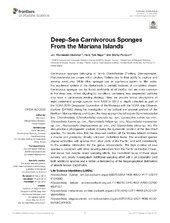Deep-Sea Carnivorous Sponges From the Mariana Islands
Peer reviewed, Journal article
Published version

View/
Date
2019-07-10Metadata
Show full item recordCollections
Original version
https://doi.org/10.3389/fmars.2019.00371Abstract
Carnivorous sponges belonging to family Cladorhizidae (Porifera, Demospongiae, Poecilosclerida) are unique within phylum Porifera due to their ability to capture and envelop small prey. While other sponges use an aquiferous system to filter water, the aquiferous system of the cladorhizids is partially reduced or completely absent. Carnivorous sponges can be found worldwide at all depths, but are more common in the deep sea, where oligotrophic conditions containing less suspended particles may favor a carnivorous feeding strategy. Here, we provide formal descriptions of eight cladorhizid sponge species from 1229 to 5813 m depth collected as part of the NOAA 2016 Deepwater Exploration of the Marianas with the NOAA ship Okeanos Explorer (EX1605) during the investigation of the bathyal and abyssal seafloor off the Northern Mariana Islands and Guam: the harp sponge Chondrocladia (Symmetrocladia) lyra, Chondrocladia (Chondrocladia) coronata sp. nov., Lycopodina subtile sp. nov., Abyssocladia fryerae sp. nov., Abyssocladia kellyae sp. nov., Abyssocladia marianensis sp. nov., Abyssocladia stegosaurensis sp. nov., and Abyssocladia villosa sp. nov. We also provide a phylogenetic analysis showing the systematic position of the described species. Our results show that the deep-sea seafloor off the Mariana Islands contains a diverse and previously virtually unknown cladorhizid fauna. The examined species display similarities with species from other parts of the Pacific, and add considerably to the available information for the genus Abyssocladia. The high number of new species is consistent with other recent publications from the Pacific and Indian Ocean, and shows that despite recent sampling efforts, the cladorhizid fauna of these areas remains very poorly investigated. Additional sampling effort will in all probability yield both additional species and a better understanding of the biogeographical distribution of already known cladorhizids.
